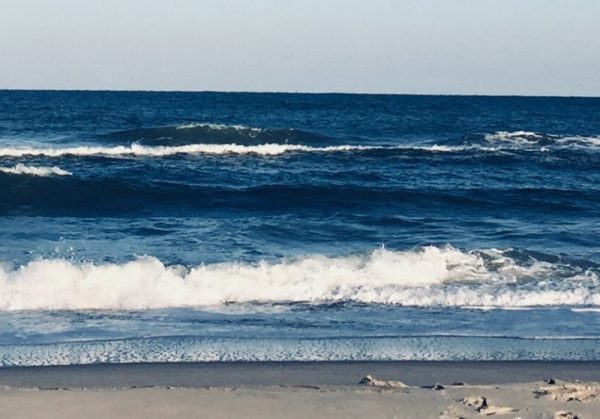In getting things packed up for our recent move, one of our young helpers unearthed a cassette audio tape. She looked at it quizzically, turning it over for clues about its function. It was like watching early man discovering fire.
I think everyone should move every once in a while — at least once per decade. It is an opportunity to go through old stuff and get ride of unnecessary things. If you’re paying the movers by the pound, you’ll be surprised at just how easy it is to unburden yourself of old clothes, books and electronics you had thought so long were so necessary.
The benefit of moving and lightening yourself is so beneficial that it would be worthwhile to move if only next door.
I found unopened boxes from the seventies that had accompanied me to college, grad school, and through a succession of apartments and houses for forty years. One contained a bottle of English Leather cologne — its contents had evaporated long ago. Another held an old tape recorder (hence the cassette above): the decayed C batteries (remember them?) had destroyed the innards with that special rusty acidic mess that seeps from darkness, decades and disregard.
It was tough making some disposal decisions. Should I keep my varsity jacket? These certificates? These black-and-white photos from the early fifties that look special, but we have no idea who that guy is with the fedora and white shirt, waving from his unknown porch? What to do with all these hymnals and songbooks from my protestant past?
Should I keep this nylon tricot shirt? This wide orange tie with paisley explosions? That’s easy. No.
My better half, Pani Marsha, and I learned a good lesson over these last few months of moving from our beloved East Pittsburgh to North Carolina. And that lesson is this:
You don’t need stuff to help you keep the past.
What you remember, what you keep in your heart, is something that cannot be taken away, or even given away. We all like photographs and histories: but we don’t need them.
We will always have our past, our memories of little girls and vacations, of family pets and long passed relatives, of nutroll baking and Lenten Missions.
We will always have our yesterdays.
And even if my memory grows short through the weakness of age and loss of cognitive function, I know — without a doubt — that on the Last Day, the Lord will restore our memory to perfection: a perfection that is no longer distorted by the false division of past, present and future.
We will always have our yesterdays.
* * * * * * *
But here is where age and adulthood become a burden. Over time, as we get older, the past becomes more appealing than the present, and the future becomes at least depressing, if not outright frightful. Despite all the youthful resolutions we made to the contrary (as in, “when I get old, I’ll never look backward like my grandparents do”), we find ourselves saying painfully incriminating things like:
“Kids these days” … or
“Things were better, simpler back then” … or
“This country is not going to survive” … or
“I can’t believe God will let the world go on like this.”
We probably swore that we would never talk this way … but here we are.
Here we are pining for the Past. We probably know that the Past is never what we crack it up to be. We probably suspect that the appeal of the Past is that it never challenges our interpretations, since it is cleaned up and permanently set still.
But it’s nice to cling to it. Even though we know better. Even though we understand, sadly, that clinging on to past and living in the present is like driving forward while watching the rear view mirror.
There is a big difference between childhood and adulthood. A child doesn’t (or shouldn’t) worry much about the future: but that usually changes as he or she gets older. The future gets colder, full of anxiety and worry. Death haunts the future in the fallen world, and St Paul says that the fear of it is the root of sin (Hebrews 2.15). Rich fools try to build enough barns to stave off the bitter end (Luke 12.13-21). People in general fall away from childlike wonder and trust into soul-darkening passions (Romans 1.18-32).
And we all, staring into the face of a New Year, try our best to make plans and resolutions. Anxious about the unknown lands of the future, we attempt to draw maps of the “not yet” based upon our experience of the “now.” But all the while, we are like pre-Columbus cartographers, fearful of the edge of the world over the horizon, suspecting that in not a few spots we might have to write, like on the old world maps, “here be monsters.”
This is what St James says about resolutions that try to box in the future and shut the door to keep out the fear and cold of death: “Come now, you who say, ‘Today or tomorrow we will go to such and such a city, spend a year there, buy and sell, and make a profit’; whereas you do not know what will happen tomorrow. For what is your life? It is even a vapor that appears for a little time and then vanishes away” (James 4.13-14).
Yes, that’s St James in his usual toughness. He’s not too pleasant here, but he’s right. Manmade plans, strategies and programs that are built on the fear of death will never work out. The future will not consent to be managed. To the small human mind, the future is always chaotic and dark. It is wild, never tamed.
You cannot take this tiger by its tail.
And that, in a nutshell, is why we aging adults like to cling to the past. Daydreams stay put at least, like a just made bed, even if they may not be real.
* * * * * * *
This New Year, like all New Years forevermore, is wild.
But in Christ, it is good.
Faith, neatly put, is trusting God with Time. It is the recognition that Time is onlyHis Creation. It is the vision of Christ, the Word, dwelling in not only the distant Past and the infinite Present, but also the far-flung Future, even if “there be monsters.”
Faith — Orthodox Faith — recognizes Christ through chaos. Christ is the Dayspring just over the horizon, in the dawn rising.
Faith knows — even though it is hard work to reach this wisdom — that only Christ occupies the future. There is no Tomorrow that is not filled by His Today. That is the simple reason why St Paul says “Behold, now is the accepted time; behold, now is the day of salvation” (2 Corinthians 6.2).
If Christ occupies tomorrow and renders the chaos of the future into the poetic sweet reason of His Presence, then we old Christians do not have to be afraid. St John the Theologian is sure of this: “There is no fear in love; but perfect love casteth out fear” (1 John 4.18).
Perfect Love — that is, the infinite Presence of the Holy Trinity — pushes all fear out of tomorrow, and turns the darkness of the future night into the morning bright.
* * * * * * *
We have our yesterdays in sentimental memory, in our photo albums and tape cassettes, our certificates and musty books and cedar chests.
But in Christ, we also have our tomorrows.
* * * * * * *
What would it be like for an Orthodox Christian, to walk into tomorrow, in faith and in love? Just like going forward to the Eucharist, to receive God in Body and Blood?
Here are some New Year’s Resolutions that even St James would like:
Work hard to recognize Christ everywhere, and every time. You will have to pray a lot and learn Orthodox wisdom: that is the job of getting older. No one has graduated from God’s School.
Work hard to love. Forgive, even if you can’t forget (I don’t think this is ever possible anyways). Doubt your emotions: disbelieve your passions. Always try to do newer and better things. Recognize the Face of Christ in everyone. Walk out into Creation and say, “This is my Father’s world.” Grow a garden.
Surrender. Commune with God in His Mysteries. Accept the Peace of Christ. Rest in Him. Instead of worrying, be thankful. Keep only good and beautiful things in your room and in your mind.
Permit yourself to be happy. Be brave enough to be thankful.
Look for Christ in the New Year, the next month, week or day, in every morning.
After all, you are moving. Maybe not to another house. But you are indeed moving to something stranger, something further away than even North Carolina is from Pennsylvania.
You are moving from now into then. You are, whether you like it or not, stepping into Tomorrow.
You don’t need to be afraid: “I am with you always, even to the end of the age” (Matthew 28.20).
In Christ, we have tomorrow.

















